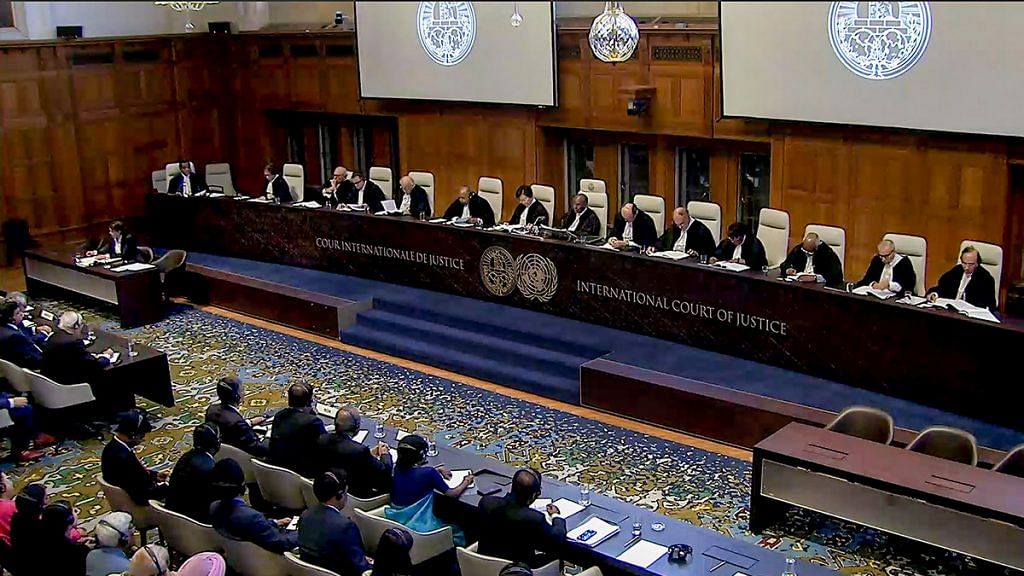The almost unanimous decision of the International Court of Justice at the Hague, Netherlands, in Kulbhushan Jadhav case has added one more episode to the unending list of Pakistan’s international embarrassments.
Pakistan could have saved itself the embarrassment had its army allowed civilian authorities to deal with the matter once Jadhav was arrested in 2016. This is not the first time that Pakistan’s military has not given space to its civilian counterparts, more so diplomats, who will now be asked to clean up the mess created by them. This is what happens when military rules a country with a civilian façade.
The International Court of Justice (ICJ) vindicated India’s stand that Jadhav was denied consular access under Article 36 of Vienna Convention on Consular Relations 1963 and declared that Pakistan had breached its obligations incumbent under the provision. As a remedy to what Pakistan did, the ICJ ordered for effective review and reconsideration of conviction and sentence of Jadhav. It also ruled that Article 36 does not exclude from its scope persons suspected of espionage – a big relief for nationals of both countries, who have been arrested on such charges.
Also read: How Pakistan tried to strong-arm ICJ at Kulbhushan Jadhav hearing
Jurists and diplomats on both sides of the border had expected this verdict – a partial victory for India and Pakistan. In simple terms, Indian High Commission officials can now meet Jadhav and the latter will have access to legal support for his retrial. On the question as to whether he will face retrial in a civilian court or the military one, like last time, the ICJ has no jurisdiction to deal with this issue. But a close reading of the judgment would indicate a trial befitting provisions of Vienna Conventions – perhaps a hint towards civilian trial. There is still a long road ahead for his release and eventual return to India.
Pakistan army initially thought that it had hit a jackpot with the arrest of Kulbhushan Jadhav. A huge hype was created on his arrest within and outside Pakistan. His “confessions” were regularly played on compliant Pakistani media outlets to justify capital punishment given to him by military courts. The army also pushed its diplomatic community to carry out a smear campaign against India for its alleged involvement in terrorism in Balochistan – perhaps to cover up for its own misdeeds.
Once the case reached the ICJ, Pakistan made a sham of the meeting between Jadhav and his mother and wife. The way it allowed them to meet Jadhav in highly opaque and controlled conditions raised serious doubts over the “confessions” that were being re-replayed on Pakistani media. Still, it didn’t allow consular access.
Also read: Kulbhushan Jadhav case — Times Now says ‘categorical win’ for India, Express is sceptical
Soon after the ICJ announcement, Pakistan army spokesman Asif Ghafoor justified the military court trial of Jadhav – a practice being questioned even within Pakistan. To cover up the setback, Shah Mehmood Qureshi, Pakistan’s foreign minister, while addressing media Wednesday, assured the country that Jadhav would remain in Pakistan and would be treated in accordance with the laws of the land. Now, even Pakistan Prime Minister Imran Khan has said that the country will move on the case as per law.
Nevertheless, a window of reconciliation has opened up between the two countries, which should be utilised by India to press for the early return of Jadhav – his family needs him. It is no time for point scoring that one has witnessed on media since last evening. Pakistan should also keep in mind that India had allowed consular access to hundreds of Pakistanis, who were involved in terrorism and espionage (called security prisoners), in Kashmir and the rest of India. All were tried by civilian courts and most of them are back with their loved ones. A far more humane and judicious approach is required in this case as well.
Also read: Full text of International Court of Justice order on Kulbhushan Jadhav
The author is a former Intelligence Bureau official who has served in the Indian High Commission in Islamabad and in Kashmir. Views are personal.
